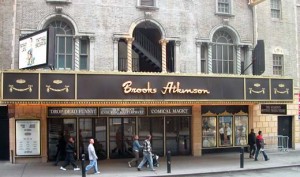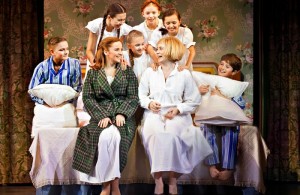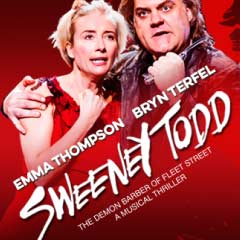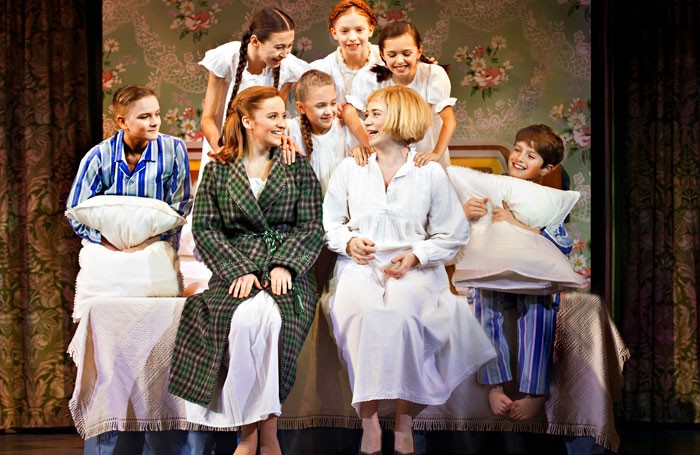** NOTE: THIS SPEECH WAS GIVEN AS PART OF THE YOUNG CRITICS’ PROGRAMME HELD AT WINCHESTER’S THEATRE ROYAL ON APRIL 4, what is ed 2015 **
No one ever built a statue to a critic, it was once famously said, but in 2013 two critics received OBE’s in the Queen’s New Year’s Honours list. Michael Billington and Philip French, theatre and film critics for The Guardian and The Observer,were honoured after writing reviews in their particular disciplines for a 100 years between them. And in New York, there are not one but two Broadway theatres named after critics, Brooks Atkinson (pictured left) and Walter Kerr. We don’t yet have a Ken Tynan or even a Jack Tinker Theatre here, let alone a Billington.
(pictured left) and Walter Kerr. We don’t yet have a Ken Tynan or even a Jack Tinker Theatre here, let alone a Billington.
And 2013 marked another centenary: that of the Critics’ Circle itself. So critics have been around for a long time, and are still having a demonstrable influence in setting the cultural agendas of the areas they cover. But will they be around much longer?
Some years ago, I wrote a feature that was titled What’s the Point of Critics, and I quoted some of my colleagues’ reactions to the Queen musical We Will Rock You, as well as my own. “Only hard-core Queen fans can save it from an early bath,” wrote my then Daily Express colleague Robert Gore-Langton, and I myself called it a “grim spectacle” and “tacky, trashy tosh” in the Sunday Express.
Those were some of the kinder comments. The Daily Telegraph’s Charles Spencer thought that far from being guaranteed to blow your mind, it was instead “guaranteed to bore you rigid”, concluding “The show is prole-feed at its worst”.
There are either more hard-core Queen fans than the Daily Express expected, or it’s reaching a wider demographic of what the Telegraph dismissively called ‘proles’, because it ran for over a decade at one of London’s largest theatres and also won a special Audience Award at the 2011 Olivier Awards in a public vote for people’s favourite show.
Is this a rebuke to the so-called power of the critics? And just as importantly, how are critics being affected by the changing fortunes of the outlets where they write? Not only are the traditional distribution channels of the print media changing, but the online world is also one in which blogs, bulletin boards, chatrooms and Twitter are offering far more outlets for opinion. Everyone has an opinion, of course; but what what they now have, too, is the means to broadcast and publish it, whether in the form of a 140-character tweet or contributing to one of the numerous theatre websites. It means that everyone, now, is a critic. Or at least, has a voice.
The result is that far from being the ultimate word on a production, critics are only the start of a conversation around it, not the end of it. That’s something I personally welcome: it means that the conversations that critics are part of are now richer, as critics have also had to become more engaged with both those they write for and those they write about than ever before.
But it also means that there’s a lot of noise to filter before readers get down to the authority of people actually appointed (rather than self-appointed) for their expertise and knowledge. And amid all the noise of the internet, authoritative voices are even more important than before, not less. But establishing one of those doesn’t require the backing of a professional media organisation anymore; the ability set up and manage a blog may be all that is necessary, as the West End Whingers proved over here, with a catchy name and an even more catchy turn of phrase that gave them international notoriety when they dubbed Andrew Lloyd Webber’s Love Never Dies as Paint Never Dries.
My colleague Terri Paddock, founder and former editorial director of Whatsonstage, and I have recently set up a new initiative called My Theatre Mates , whose aim is to consolidate and aggregate the power of independent theatre journalists by bringing our separate blogs under one distribution banner. We still have our independent sites, but we now have a way for the public to find us in one place.
, whose aim is to consolidate and aggregate the power of independent theatre journalists by bringing our separate blogs under one distribution banner. We still have our independent sites, but we now have a way for the public to find us in one place.
The best writing about the theatre isn’t necessarily happening in the mainstream media anymore either. In 2010, he academic and writer Jill Dolan won the George Jean Nathan Award, America’s biggest theatre criticism award, for her blog The Feminist Spectator.
Writing in a Guardian blog, Karen Fricker – a fellow academic and part-time critic – noted at the time, “One can’t also help but feel a pragmatism in the committee’s decision – opening up to bloggers means that they’ll continue to have people to give the award to.” George Hunka, another American theatre critic turned blogger, also noted of Dolan’s award, “Anyone with access to the web can be a critic these days, but fewer and fewer people can actually make a living at it. Dolan, presumably, doesn’t get paid a dime for her blog, but has her academic income to support her.”
Real, experienced critics matter more, not less, in this new world. But where do you find them? My Theatre Mates is one place to start. There’s no question that the landscape of journalism is changing forever, and the models have changed faster in the last 20 years than the previous 200.
The Edinburgh Fringe provides a nearly perfect working model of what the future may look like. Just as the fringe provides the ultimate form of democracy, where there are no barriers to entry and anyone can put on a show, so anyone and everyone can review them, too.
But, actually, out of that cacophony of voices out there, the critic who not only has something to say but is also listened to is more important than ever. Amid the welter of unknown by-lines, Lyn Gardner  (pictured left) in The Guardian demonstrates a tenacity and dedication in seeking out the most interesting work that makes her work all the more authoritative. Gardner makes her living by doing so; but it is becoming increasingly more difficult for critics to do so.
(pictured left) in The Guardian demonstrates a tenacity and dedication in seeking out the most interesting work that makes her work all the more authoritative. Gardner makes her living by doing so; but it is becoming increasingly more difficult for critics to do so.
When Edward Seckerson resigned a couple of years ago as chief classical music critic of The Independent, he revealed that he was being paid just £90 a review; that was down from the £150 he used to be paid. On the other hand, there is quite a lot of money sloshing around in the online world beyond the editorial floor; when Ariana Huffington sold The Huffington Post to AOL, it was sold for a staggering $315m — all for a site built on the free labour model of unpaid blogs.
In the last few years, New York has seen the elimination of the role of theatre critics on a number of leading publications – as Michael Riedel wryly noted in a column in the New York Post, “Being a member of the New York Drama Critics’ Circle these days is like being in a revival of Agatha Christie’s And Then There Were None.”
He was reporting the layoff there of the late Journal News critic Jacques le Sourd, who had served as critic for 35 years, and as le Sourd wrly observed, “My next assignment was on the Depression hits Broadway. I don’t have to do that story now. I’m living it.”
This situation has also been mirrored in LA, where a number of leading critics have lost their jobs, from the LA Weekly to the Daily News. But the theatre community there has far from welcomed this disturbing development, and the artistic directors of three of LA’s leading theatres, Gilbert Cates of the Geffen Playhouse, Sheldon Epps of the Pasadena Playhouse and Michael Ritchie of Center Theatre Group, wrote an eloquent joint letter decrying it.
As they say, “It may seem somewhat ironic that leaders of arts institutions would come out in favor of further criticism. It would be like fire hydrants getting together to come out in favor of more dogs. But, as artistic leaders who run three of the larger theater organizations in Los Angeles, we’ve recently become worried. Over the last few months there has been a conspicuous disappearance of arts writers and editors in our local papers… Criticism is always difficult to hear, especially if it comes from friends, relatives, acquaintances, neighbors, strangers, bystanders or casual observers. But it is even harder to bear when one realizes that criticism is being shared publicly with thousands of readers and may form the basis of their own opinion toward your work. Yet we depend on the voices of critics and arts reporters to help create a conversation with our community. If we let these voices slowly and quietly disappear, the consequences are simple and inevitable: fewer people will know about the productions, fewer people will purchase tickets, and eventually, fewer theaters will exist.”
So, to adapt the old adage, “If a tree falls in a forest and no one is around to hear it, does it make a sound?”, if a theatre production opens and there is no one to list or review it anymore, has it actually happened? Of course it has; but reviews act as a permanent record of an ephemeral art, and they also encourage people to attend and support it before it passes. We lose that at our peril. And artists are realising it, even if editors and proprietors aren’t.
In the last couple of years, the trees have started falling in the British forest with alarming frequency. The Independent on Sunday and Sunday Telegraph in turn both gave up having regular critical reviews; so has the daily Metro free sheet in London, while the print incarnation of Time Out, too, has gone free and shrunk, so it can only carry three or so reviews a week, though it has many more online.
 As David Lan (left), the artistic director of the Young Vic, told The Stage in 2013 when his organisation won three of the nine Critics’ Circle Theatre Awards, “To receive these awards from critics is helpful. One of the things the critics do is create confidence in a piece of work. There are some other ways of creating that confidence – partly the reputation of the theatre and partly the reputation of the actors. Not many people think too much about the directors but they’ll also think about the writers. One of the ways you try and talk to your audience is say ‘it’s not too big a risk’ or ‘it’s worth taking a risk on’ and what the critics can do when they write about a show is create that confidence in it.”
As David Lan (left), the artistic director of the Young Vic, told The Stage in 2013 when his organisation won three of the nine Critics’ Circle Theatre Awards, “To receive these awards from critics is helpful. One of the things the critics do is create confidence in a piece of work. There are some other ways of creating that confidence – partly the reputation of the theatre and partly the reputation of the actors. Not many people think too much about the directors but they’ll also think about the writers. One of the ways you try and talk to your audience is say ‘it’s not too big a risk’ or ‘it’s worth taking a risk on’ and what the critics can do when they write about a show is create that confidence in it.”
Now its time, I think, to establish confidence in ourselves again. I’ve consciously stayed ahead of the game by adapting along the way to new things. My Stage blog is now long established – I’ve been writing it since 2005, so it has become not only an archive in itself but also a place that’s well known in the industry for taking up causes in. It sometimes gets me into trouble – I’ve had a few lawsuits, none of which have led anywhere, but it proves if nothing else that you’re being heard.
I’ve also now got my own personal website shentonstage.com (the one you are reading now!), where I post unique content as well as links to other content. The big problem here, of course, is time; finding time to update it regularly, when I’ve still got deadlines for paying jobs to meet. Fortunately, I’m an early riser — I’m sometimes up as early as 5am, simply to get the work done. You can’t be lazy in this job.
But I also consider myself extremely lucky — I love the theatre and I love being part of its active promotion.
As a freelance critic, I don’t belong to a single media outlet; and the good thing is that this has meant that I’ve been able to evolve my online identity in its own right. And part of that means embracing twitter, too — and not just having an account, but posting active commentary. Twitter is the ultimate democracy — people will only follow you if you have something to say, and they want to listen. But it’s not just a broadcast channel for me — it’s also a place of genuine interaction and sharing of opinions. I love the crisp exchanges that can take place there — though not some of the online abuse. Fortunately I don’t get too much of the latter.
Nobody pays you to tweet, of course, let alone to eat (though a few restaurants have offered a free meal sin exchange for a tweet, which I’ve politely declined). But it helps to build a readership and profile.
I’d say that Twitter is one of my most important outlets now — and certainly the most immediate in terms of reaching a readership instantly after I see a show. It’s a power I feel a lot of responsibility about using responsibly. ??But then that’s the case with every and any word I write, too. If, as I do, I believe that critics matter, then so do my words. So it’s important to think about their possible impact and reach.
And that’s even more so the case when you have built or are building the platform for their distribution yourself. There are hardly any jobs left in mainstream media and they are shrinking all the time; in fact, mainstream could soon become the minority media, and the mainstream is very likely to be you and your fellow bloggers.
I’m obviously slackening off: in the three weeks I’ve kept this online diary now, capsule I’ve seen 10 shows, 7 shows and 6 shows respectively. And — shock horror — looking at my diary for the week ahead, I’ve actually got two nights that are (so far) unplanned!
But it’s really rather good to keep some flexibility in my diary; although parts of it inevitably fill up several months in advance, it’s always good to have a spare night or two in there to accommodate a surprise, a recommendation, something I want to see again, or simply to have a night off! ( Last night we stayed in and caught up on some long-ago recorded telly, including the sorrowful end of the brilliant Russell T Davies series Cucumber, and the joyous Bette Midler ITV Christmas special (pictured left)— at 69 years old, she’s still as dauntless and outrageous and stunning as ever!)
Last night we stayed in and caught up on some long-ago recorded telly, including the sorrowful end of the brilliant Russell T Davies series Cucumber, and the joyous Bette Midler ITV Christmas special (pictured left)— at 69 years old, she’s still as dauntless and outrageous and stunning as ever!)
In the last week, I’ve been on formal reviewing duty for two big revivals of shows I’ve seen many, many times before: The Sound of Music and Sweeney Todd, originally premiered on Broadway exactly twenty years apart (in 1959 and 1979 respectively), but a musical world apart. The Sound of Music is this year celebrating the 50th anniversary of its even more celebrated film version’s release, which has made this one of the world’s most popular and enduring musicals of all time (only lately eclipsed by the even bigger film success of Mamma Mia!).
But seeing it these days is often a trial; the drenching of sentiment, those endless chanting nuns and its corny celebrations of lonely goatherds and whiskers on kittens, even though Julie Andrews is sheer enchantment as Maria. Seeing a delightfully fresh (and beautifully designed) new touring stage production, pictured below, at Wimbledon on Monday, however, was to be reminded of why the show simply works when delivered in safe hands. (See my review for The Stage here)  As I also commented in my review, “We’re never too far away from an R&H production – there’s also a current UK tour for Oklahoma!, Opera North is reviving its production of Carousel soon and a big Broadway revival of The King and I is about to open – but this tremendous staging will hold its own in the best company.”
As I also commented in my review, “We’re never too far away from an R&H production – there’s also a current UK tour for Oklahoma!, Opera North is reviving its production of Carousel soon and a big Broadway revival of The King and I is about to open – but this tremendous staging will hold its own in the best company.”
We’re equally never far from a revival of Sweeney Todd either. Hot on the heels of the ‘pie shop’ production that originated at a real-life pie shop in Tooting last year and has now transferred to a meticulous recreation of it on Shaftesbury Avenue, a much, much bigger version first seen at Lincoln Center’s Avery Fisher Hall last year has been revived at the London Coliseum, with its New York stars Bryn Terfel and Emma Thompson (pictured below) reprising their roles as Sweeney and Mrs Lovett respectively, also joined again by the glorious Philip Quast as Judge Turpin who also starred in New York. ( I reviewed this one for The Stage, too, and as I point out, you can’t really compare it to the pie shop version. I can only say you really need to see both!)
I reviewed this one for The Stage, too, and as I point out, you can’t really compare it to the pie shop version. I can only say you really need to see both!)
I’ve also reviewed two new plays: the RSC’s transfer of Oppenheimer to the West End’s Vaudeville Theatre and the premiere of journalist-turned-playwright Jonathan Maitland’s Dead Sheep at the Park; and tonight I’m seeing a revival of Godspell at Hackney Empire which I’ll review on The Stage website tomorrow.
I also saw (but didn’t review) an entirely delightful kids show, The Velvetine Rabbit, at Southwark’s Unicorn Theatre, in which a toy bunny comes to life for a young boy, and was thrilled to see an audience of parents and very young kids melt in its warm presence, just as I was brushing away my own tears.
It was also a week in which I spoke quite a bit about the act of criticism itself. On Monday, I was interviewed by James Lawrence for his Actor’s Podcast series (which you can listen to here), and yesterday, I took part in Winchester Theatre Royal’s excellent Young Critics’ programme in which they are seeking to develop a new generation of young writers (you can read my speech here)
As for the week ahead, I’m seeing two evenings of new musicals — the Landor’s series Songs from the Playground development programme on Monday which is showcasing the work of Rebecca Applin this week, with a cast that includes Cassidy Janson, Stewart Clarke and Victoria Serra; and Apartment 40C, a new musical that was premiered at Fulham’s London Theatre Workshop but I missed there and am now happy to be catching at the St James Studio instead on Wednesday afternoon.
Also in the new music stakes, English National Opera are premiering a brand-new opera Between Worlds  (image left, inspired by the events of 9/11) that I’ll be seeing at the Barbican Theatre on Saturday; while elsewhere I am also catching a couple of revivals. I’ll also be at Greenwich Theatre on Thursday for the new tour of the off-Broadway musical Thrill Me that I last saw at the Tristan Bates Theatre in 2011, and I’m seeing the Imelda Staunton Gypsy transfer to the Savoy Theatre on Saturday afternoon, ahead its formal opening there on April 15 which I’ll miss as I’m heading to New York a week tomorrow — straight after going to the Oliviers next Sunday at the Royal Opera House.
(image left, inspired by the events of 9/11) that I’ll be seeing at the Barbican Theatre on Saturday; while elsewhere I am also catching a couple of revivals. I’ll also be at Greenwich Theatre on Thursday for the new tour of the off-Broadway musical Thrill Me that I last saw at the Tristan Bates Theatre in 2011, and I’m seeing the Imelda Staunton Gypsy transfer to the Savoy Theatre on Saturday afternoon, ahead its formal opening there on April 15 which I’ll miss as I’m heading to New York a week tomorrow — straight after going to the Oliviers next Sunday at the Royal Opera House.
What’s going to win? In this week’s Stage, out on Thursday, I’ll be handicapping my own choices; and on Friday afternoon, Terri Paddock and I will be joining the Curtain Up Show on Resonance FM, being broadcast live from Shaftesbury Avenue’s Theatre Cafe, to talk about the Oliviers as well.
See you on and off the Avenue and the airwaves!

